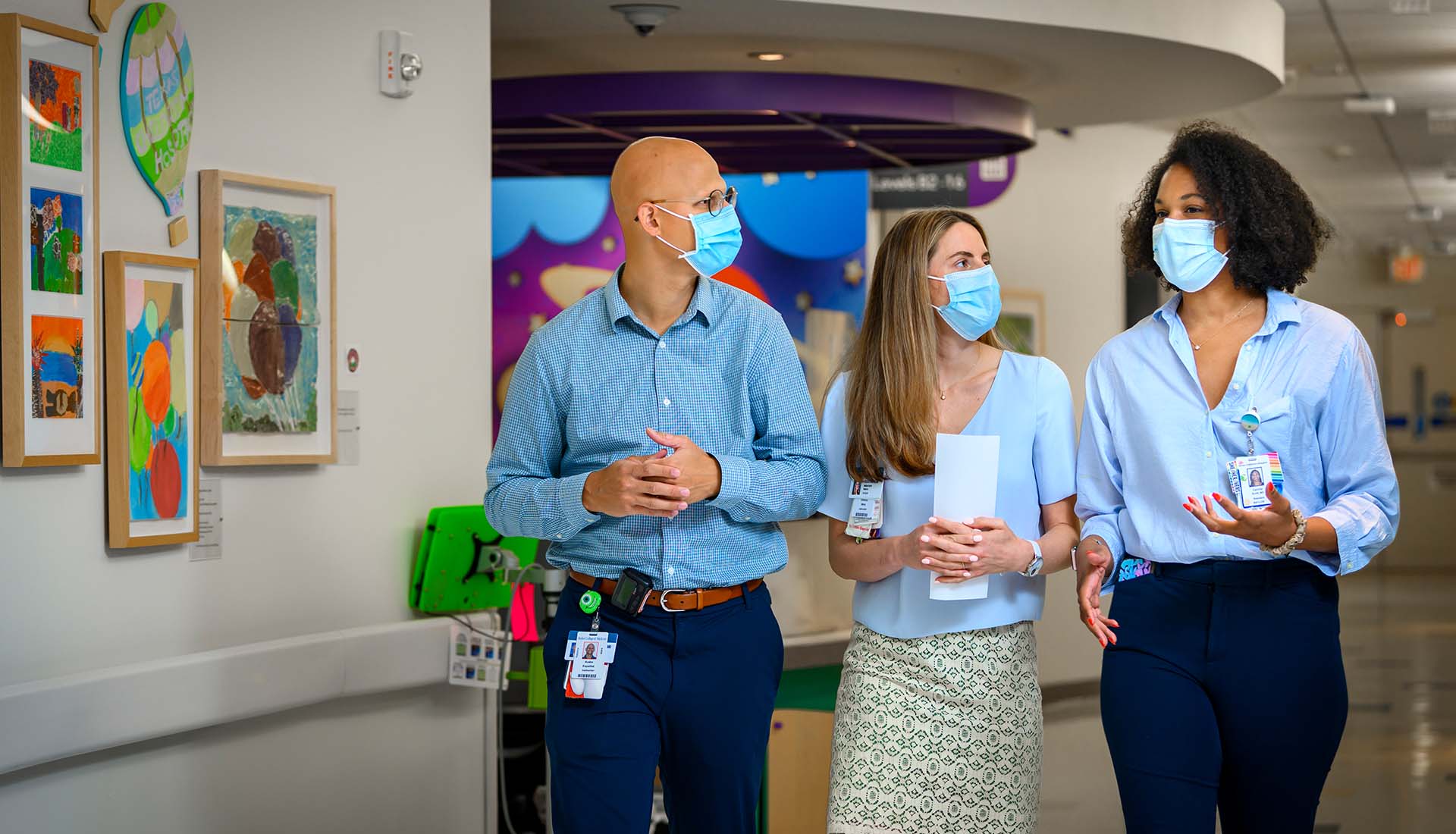


The value of diversity in health care is well described. Medical teams composed of diverse members make better decisions. Patients from historically marginalized groups have better outcomes when they believe they can trust their caregivers because of shared backgrounds and life experiences. In academia, trainees benefit from having teachers who are similar to themselves. The diversity of research teams influences the questions they ask and the methods used to answer them.
“The Department of Pediatrics has had a longstanding commitment to improving workforce diversity,” said Susan L. Gillespie, MD, PhD, who was appointed Vice Chair of Justice, Equity, Diversity and Inclusion in the Baylor College of Medicine-Texas Children’s Hospital Department of Pediatrics in December 2021.
“For the past several years, I have worked with the residency program to increase the number of residents who come from ethnic and racial groups that are underrepresented in medicine. Our department has been enriched by the diversity that we’ve fostered,” she said.
Improving the environment further will take more than adding numbers. Dr. Gillespie emphasized, “We still have work to do to fulfill the vision of creating a just, equitable and inclusive learning and workplace environment.”
“We want to create a community and culture in which everyone has an opportunity to thrive personally and professionally — regardless of their group identity (e.g., race, ethnicity, age, gender identity, sexual orientation, national origin, language, religion or physical/mental/developmental abilities). The addition of justice to the mission refers to addressing structural barriers that may hinder thriving,” said Dr. Gillespie, Associate Professor of Pediatrics-Retrovirology.
The COVID-19 pandemic was challenging for trainees, who had fewer opportunities than usual to learn how to interact comfortably, face to face with diverse patients and parents. Because of COVID-19 precautions, they sometimes met with parents via remote video.
Experience during the COVID-19 pandemic exposed some gender-based inequities among faculty. For example, a study led by Lara Shekerdemian, MD, MHA, showed that women are more likely to bear the burden of family caregiving, which may lengthen their timelines for promotion, especially for women faculty involved in research. Dr. Shekerdemian now is Pediatrician-in-Chief at Texas Children’s and Chair of the Department of Pediatrics at Baylor.
“Our response to these and other challenges will determine how well prepared we are to provide the best education to our trainees and the best care to our patients. We must be willing to look at inequities in the workplace as opportunities to make systemic improvements that ultimately will create an environment where everyone feels a sense of belonging and where they can reach their full potential,” Dr. Gillespie said.
Social unrest and injustices also affected our community. To help support members of the workforce and patients who were distressed after the police killing of George Floyd, the Psychology Division within the Department of Pediatrics established the Collaborative on Racial Equity and Inclusion for Black Youth to develop a number of programs to address concerns with colleagues in the Texas Children’s workforce, patients and their families, and the larger community.
The collaborative began in the summer of 2020, when Mark A. Wallace, Texas Children’s Hospital President and CEO, reached out to Karin Price, PhD, Chief of Pediatric Psychology at Texas Children’s and Associate Professor of Pediatrics-Psychology at Baylor.
 Clinical psychologists Gia Washington, PhD, left, and Ashley Butler, PhD, look over books used to help book club members provide culturally appropriate care to Black patients and families.
Clinical psychologists Gia Washington, PhD, left, and Ashley Butler, PhD, look over books used to help book club members provide culturally appropriate care to Black patients and families.
”As psychologists, we have skills in facilitating sensitive and sometimes challenging conversations, so we partnered with Human Resources to deliver training about unconscious bias to leaders at Texas Children’s,” said Ashley Butler, PhD, a clinical child psychologist at Texas Children’s and Associate Professor of Pediatrics-Psychology at Baylor.
Dr. Butler chairs the collaborative, which is co-chaired by Gia Washington, PhD, a clinical psychologist at Texas Children’s and Assistant Professor of Pediatrics-Psychology at Baylor.
For employees, Dr. Washington launched affinity groups for various social identities, such as Black, Jewish or Asian American. One affinity group was for men, who are a minority (17%) of Texas Children’s employees. The groups, some of which still exist, met for an hour once a month to support each other, celebrate their shared culture, and promote well-being.
Both Dr. Butler and Dr. Washington continue meeting once a month with Black pediatric psychology trainees to provide career development advice and support related to microaggressions or discrimination that the trainees experience. At a time when data from the Journal of Pediatric Psychology show only 3 percent of pediatric psychologists in the United States are Black, they want to encourage the trainees to continue in their careers.
“Nationally, there is a shortage of behavioral health providers, and there is even lower access to behavioral health for families and children of color. There is an under-representation of Black trainees who complete graduate school and then choose pediatric psychology as a specialty. We want to make sure that the workforce is diverse and that our providers are competent to work with diverse children and families,” Dr. Butler said.
A work group in the collaborative uses continuing education to help members provide culturally appropriate care to Black patients and families. Besides traditional continuing education presentations, the work group:
“After showing the video, we discussed it in small groups. We asked, ‘What was something that you didn’t know? What surprised you from watching that?’ We got comments that the video was very powerful — a novel way to increase awareness of what diverse providers may experience and to recognize that showing up to work as your authentic self is important for patients to see themselves in you as a provider,” Dr. Butler said.
She also leads a work group that writes a quarterly series called “Take Five” to increase awareness and education around matters related to discrimination or racism. Aimed at employees, these articles appear in Connect, an internal webpage, and complement “Five Facts,” a series written by Debra Lacy, EdD, Texas Children’s Director of Diversity, Equity and Inclusion.
Quarterly blogs on the Texas Children’s public website are directed toward parents of pediatric patients. For the children, the psychologists have worked with Child Life specialists to bring in authors to answer questions from the children and to give away copies of their books. Either the authors themselves or the characters in the books represent diverse racial or ethnic groups.
In addition, the Psychology Division developed a specialty service line to help children experiencing distress related to discrimination. Perhaps a teacher disciplines a Black child in a disproportionately harsh manner. Depending on the child’s age and the specific situation, the psychologist may work with the family, as well as the child, to support the child’s well-being.
The collaborative’s goals include reaching out even more to families and the community at large.
“We’re trying to bring together some parent advisors to help inform us on next steps. What resources could we provide to help children’s mental health and well-being? We want to have, available publicly on our website, resources for various topics related to discrimination and stress and some tools for families,” Dr. Butler said.
Through a variety of important initiatives, the Department of Pediatrics is deeply committed to ensuring that the workforce, patients, families and the community increase understanding and resilience in building justice, equity, diversity and inclusion both within and outside the workplace.